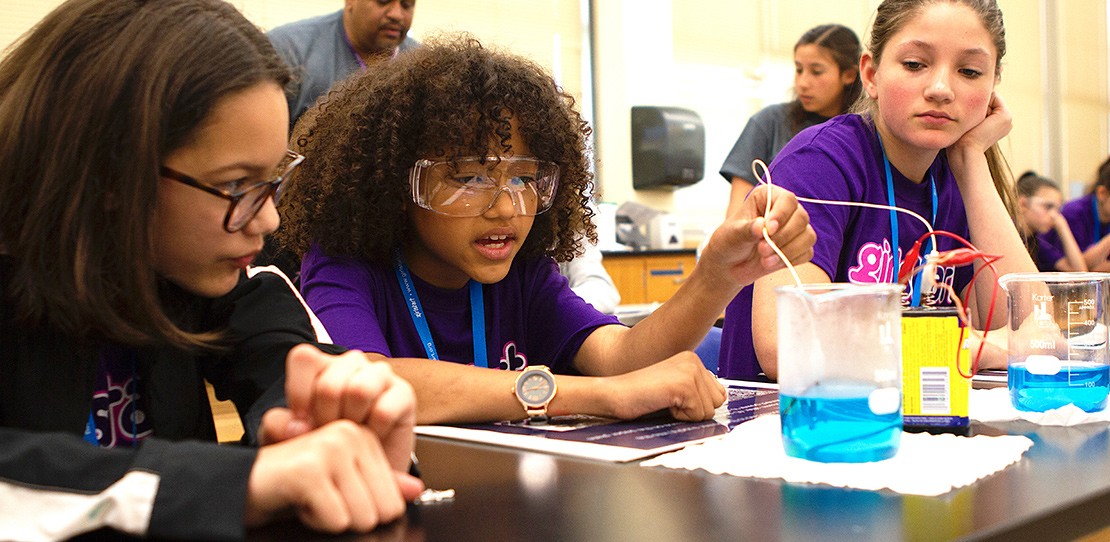Closing the Gender Gap and Encouraging the Next Generation of Engineers

Women Face Unique Challenges in STEM
Even though diverse ideas and experiences are essential to engineering’s success, women largely are underrepresented in the STEM field. But several companies and nonprofit organizations are dedicating their time and resources to ensure that the next generation is included and supported on their journey. For more than 20 years, Girlstart, an Austin-based nonprofit, has been working towards increasing girls’ interest and engagement in STEM through innovative educational programs across the US. Executive Director Tamara Hudgins explains how they have addressed this gap and pivoted to support girls through virtual opportunities.
To learn more about Girlstart, please visit girlstart.org.
Video transcript:
Julie Fisher: Hi, I'm Julie Fisher and I'm on the community impact team at NI. As a part of our Next 100 campaign, we'll be talking with thought leaders in diversity, equity and inclusion. Today we're talking about the unique challenges facing girls in STEM. Joining me is Tamara Hudgins, Executive Director of Girlstart. Thank you for being here Tamara. Can you please explain the mission of Girlstart and why it was created?
Tamara Hudgins: Girlstart was founded in order to empower and equip girls in science, technology, engineering and math since 1997. We've been exclusively dedicated to empowering girls in STEM.
Julie Fisher: That's awesome. Why is it important, do you think, to increase the diversity in STEM?
Tamara Hudgins: We believe that girls are part of solving the world's greatest challenges and that girls are not often included in solving those challenges. It's important for us to focus on expanding the breadth of the conversation. Girlstart has been chiefly dedicated to girls in STEM, noticing that women are approximately half of the nation's bachelor's degrees. But among STEM fields that percentage drops to under 25%, or in the case of computer science and engineering, 20%. It's also true that girls who are at-risk, or of another ethnicity, that they are also further challenged with inequities in pursuing STEM majors and careers. So Girlstart is exclusively dedicated to doing this because we believe that by empowering a diverse group of girls and women in STEM, we can solve the world's greatest challenges in innovative and exciting ways.
Julie Fisher: That's great. What do you think are some of the challenges and obstacles girls and people of color face.
Tamara Hudgins: There are a number of obstacles. One of them is self concept, and self concept is something that is formulated at the very earliest years of a child's growth and development. In Girlstart programs, we are interested in meeting every girl, where they are with their own by way and with cultural respect for all, such that girls are going to come up with answers or responses to STEM challenges that we put to them. And every girl will solve each challenge in her own way.
And all of those challenges, all of those responses challenges can be considered successful, and each girl is able then to bolster her self-concept by the continual positive reinforcement within Girlstart programs that encourages her to try new things, to take risks, to feel okay if her activity problem doesn't work on the first try, and to be given the space to redesign, just like in the engineering design process, to redesign her activity to develop grit and then to feel that sense of success. What we know at least through this sense of self-concept, we're able to continue to lift girls up, and they will continue to see a future for themselves in STEM.
What we're also interested in is in addition to providing a positive and productive environment that develops persistence and grit is also to provide role models, either near-peer role models from our STEM crew, or, also from women professionals who work in STEM, that can provide persistent and visual role models, so that girls know that they to have a future in STEM.
Julie Fisher: What do you see as some of the biggest successes that Girlstart has found with some of your programming?
Tamara Hudgins: We know that girls who participate in Girlstart after school not only score better on their standardized tests in math and science, but then they also go on to take more advanced or pre-AP math and science classes in middle school, and that's particularly meaningful because it's this type of trajectory that girls will then take algebra 1 at the earliest possible moment. And then they'll begin to take advanced science at the earliest possible moment, which then puts them on a trajectory to be viewed as highly achieving in math and science, when they present themselves at the door of high school, and then they'll be continuing on that pathway, as they head towards college.
Julie Fisher: So COVID-19 has presented a lot of challenges for nonprofits and the community at large. Can you explain how you have made a shift as an organization to virtual or online learning?
Tamara Hudgins: Learning cratered during the spring. And so, if it's the case that we know that the girls who were at-risk are sliding even further, Girlstart needs to be there for them. And so that's why we were even more focused on making sure that we provided and prepared and implemented a deeply meaningful, engaging summer camp at home program because we're really trying to offset those learning slides that COVID-19 is affecting.
Julie Fisher: I appreciated visiting the online virtual summer camp and it was amazing to see some of the projects and presentations that the girls had at the end of the week. If individuals wanted to learn more about Girlstart where should they go?
Tamara Hudgins: You could visit us at girlstart.org. We have also collected our virtually responsive suite of programs at a website called STEMathome.org. And there if you're an educator or a parent or a curious child, you can find activities and things to do that will engage your mind, expand your thinking, and encourage you to try new things, even though we're staying safe at home.
Julie Fisher: Tamara, thank you so much for joining us today. We really appreciate your partnership and everything that you do for girls in STEM.
Tamara Hudgins: We are so grateful to have you as a partner. Thank you so much.

